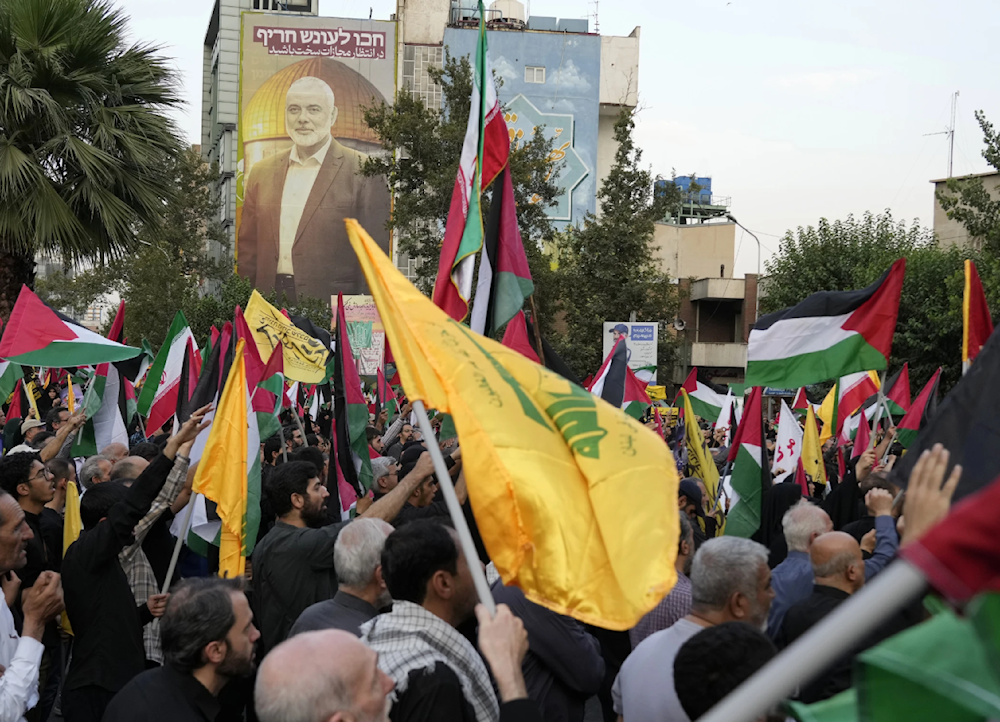Why Israeli strikes in Iran, Lebanon will not harm Resistance much
As resistance factions and the occupation come closer to a regional war, a researcher believes it is improbable because neither side fully wants it.
-

Iranian protesters wave Iranian, Palestinian, and Hezbollah flags to condemn the killing of Ismail Haniyeh in Tehran on July 31, 2024 (AP)
According to Bilal Y. Saab, an Associate Fellow for Chatham House MENA, 'Israel's' aggressions in Iran and Lebanon have little impact on the Palestinian resistance Hamas and the Lebanese resistance Hezbollah.
As resistance factions and the occupation come closer to a regional war, Saab believes it is improbable because neither side fully wants it.
According to him, it can be widely agreed upon that the Israeli assassination of the head of Hamas's political bureau and leader, Ismail Haniyeh, and Hezbollah commander Sayyed Fouad Shokor in Lebanon do nothing but severely postpone peace talks in Palestine and ensures continued confrontations with the resistance.
Saab contends that Haniyeh's martyrdom has little impact on Hamas, seeing as the group's real commander is Yahya Sinwar, who is stationed in Gaza and has been on the frontlines since 2017.
Likewise, Hezbollah has successfully replaced considerably more powerful leaders than Shokor such as Imad Mughniyeh and Mustafa Badreddine and its military capabilities remain intact.
Due to the multi-front Axis of Resistance which encompasses Yemen, Syria, Iraq, Lebanon, and Iran itself, Saab states that Iran has pushed 'Israel' to a new reality: An attack on one front is "considered an attack against all."
Hezbollah, the Yemeni Armed Forces (YAF), and the Iraqi resistance have all contributed to this reality, Saab notes. Since opening a front on the Lebanese southern border in support of Palestine on October 8, the Secretary-General of Hezbollah, Sayyed Hassan Nasrallah has consistently indicated operations would cease only if a ceasefire in Gaza is secured.
The YAF has successfully disrupted trade in the Red Sea and targeted Israeli vessels, increasing the ante recently by hitting Tel Aviv.
According to Saab, Netanyahu knows that he will have to "answer to an angry Israeli public" if he ends any aggression, and despite feeling emboldened by "standing ovations he received during his speech in the US Congress," all US politicians are thinking about is the presidential race and all lack a comprehensive strategy for preventing the region from exploding.
Despite the Biden administration's declared inclination for regional de-escalation, no US leader has indicated red lines to Netanyahu.
US officials have indeed informed Netanyahu that they will not back an all-out war, but Saab believes the hazardous tit-for-tat between 'Israel' and the Axis will persist.
Nasrallah ushers in a new phase, asserts retaliation is inevitable
The Secretary-General of Hezbollah, Sayyed Hassan Nasrallah confirmed on Thursday that the Israeli attack on Hareit Hreik in the southern suburbs of Beirut was an aggression targeting civilian buildings and killing civilians, not just an assassination operation.
The aggression resulted in the martyrdom of five civilians, three women, and two children, in addition to Iranian military advisor Milad Bidi.
Regarding the martyrdom of Haniyeh, Sayyed Nasrallah questioned,"Do they imagine they can kill the leader Ismail Haniyeh in Tehran and Iran will remain silent?" emphasizing that "Israel" has crossed major red lines.
Sayyed Nasrallah continued: "For Israelis celebrating that they have assassinated Resistance prominent leaders in Beirut and Tehran and earlier attack Hodeidah... you will cry a lot because you do not realize which red lines you have crossed and [what] you have committed."
Announcing a new phase of the confrontation, Sayyed Nasrallah said: "We are facing a major battle where matters have surpassed the issue of support fronts," announcing, "We are in an open battle on all fronts, and it has entered a new phase." He emphasized that the escalation of the new phase "depends on the reactions of the [Israeli] occupation."
Reaffirming the Resistance Axis' position announced on the day of the Israeli war on Gaza, Sayyed Nasrallah said that those who want to spare the region a larger and worse escalation, "must compel Israel to stop its aggression on the Gaza Strip," and that "there will be no solution except by stopping the aggression."
Following the Israeli aggression on Beirut, Hezbollah did not carry out any operations.

 4 Min Read
4 Min Read








